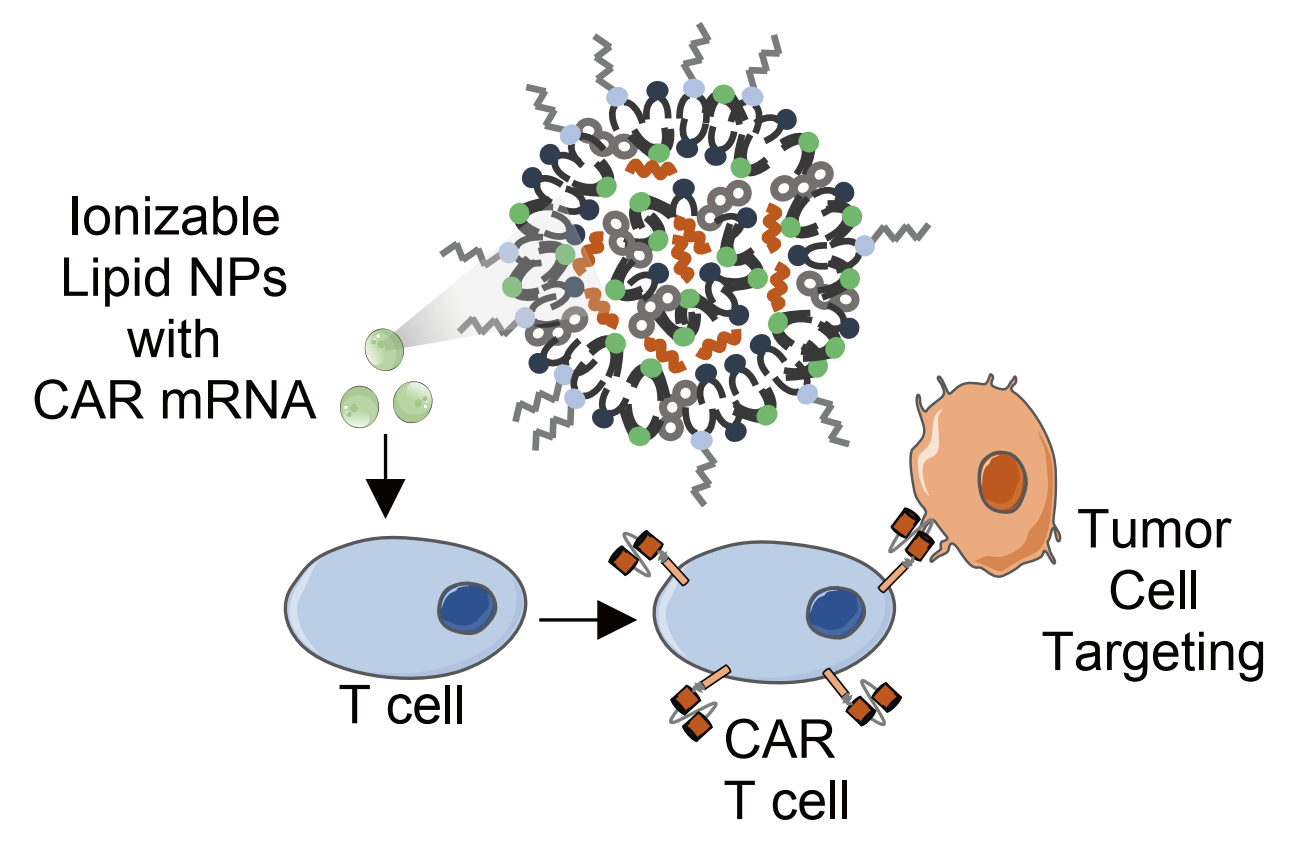New cancer immunotherapy involves extracting and genetically modifying patients' T cells so they can identify and attack tumors. This technology is a true medical breakthrough. Since CAR-T cell therapy was approved by the U.S. Food and Drug Administration (FDA) in 2017, more and more patients with leukemia and lymphoma have experienced complete remission. However, genetically modifying patients' T cells is laborious and expensive. Even if the treatment is successful, changes in the immune system can cause the patient to become seriously ill in a short period, with fever, nausea, and neurological symptoms. 
(Margaret Billingsley et al. Nano Letters, 2020)
Now, in a new study, researchers from the University of Pennsylvania have discovered that a new engineering technique that is less toxic to T cells can change the way they recognize cancer through a different mechanism. Treatment with T cells using this mechanism may bring fewer side effects to patients. The relevant research results were published online in the journal on January 17, 2020, and the title of the paper was "Ionizable Lipid Nanoparticle Mediated mRNA Delivery for Human CAR T Cell Engineering". This new engineering technique involves using lipid-based nanoparticles to deliver mRNA across the cell membrane of T cells, rather than using genetically modified viruses to rewrite T cell DNA. Using the former method would be preferable because it would only temporarily change the patient's immune system.
CAR-T cell therapy involves genetically modifying T cells isolated from patients to express a chimeric antigen receptor (CAR) on their surface. The expressed CAR allows these T cells to recognize cancer cells as foreign invaders and clear these cancer cells from the body. Current engineering techniques involve extracting some numbers of T cells from a patient, rewriting their DNA with a virus so that they express these CARs, and then injecting them into the same patient.
The first author of the paper, Billingsley, said, Billingsley said, "This viral genetic engineering method produces T cells that express CAR permanently, but this can lead to serious adverse reactions because CAR-T cells remain active in patients even after the cancer cells are eliminated. However, the use of mRNA can produce CAR-T cells that transiently express CAR. This allows clinicians to administer CAR-T cells at a dose targeted to cancer cells, while at the same time not harming many healthy cells, thereby reducing side effects. "
Since the method of introducing mRNA into T cells has not yet reached clinical application, its use is still limited. As the current standard method, electroporation involves punching cell membranes with electrical pulses. It is not an attractive option because this highly invasive process has a higher risk of killing T cells or affecting their function. Even when optimized, electroporation typically results in 50% of cell death during cell manufacturing.
The corresponding author of the paper, Dr. Mitchell, said, "When delivering therapeutic mRNA to T cells, you always need to strike a balance between potency and toxic side effects. Our laboratory designs ionizable lipid nanoparticles that can safely cross cell membranes but release these mRNAs specifically when they need to release therapeutic mRNAs. We believe this is a huge benefit because electroporation, as the current clinical standard method, kills most T cells derived from patients. "
In in vitro experiments, researchers have found that CAR-T cells expressing CAR through their nanoparticles are as effective in killing cancer cells as virally modified CAR-T cells currently used clinically. Future research plans include in vivo studies on the impact of this delivery platform to determine the impact of transient CAR expression on therapeutic efficacy and side effects. Given the increasing number of toolboxes for RNA therapy, the delivery of RNA via nanoparticles has a wide range of applications in T cell engineering, including gene editing of T cell DNA and regulation of protein expression.
Reference
- Margaret Billingsley et al. Ionizable Lipid Nanoparticle Mediated mRNA Delivery for Human CAR T Cell Engineering. Nano Letters, 2020,

